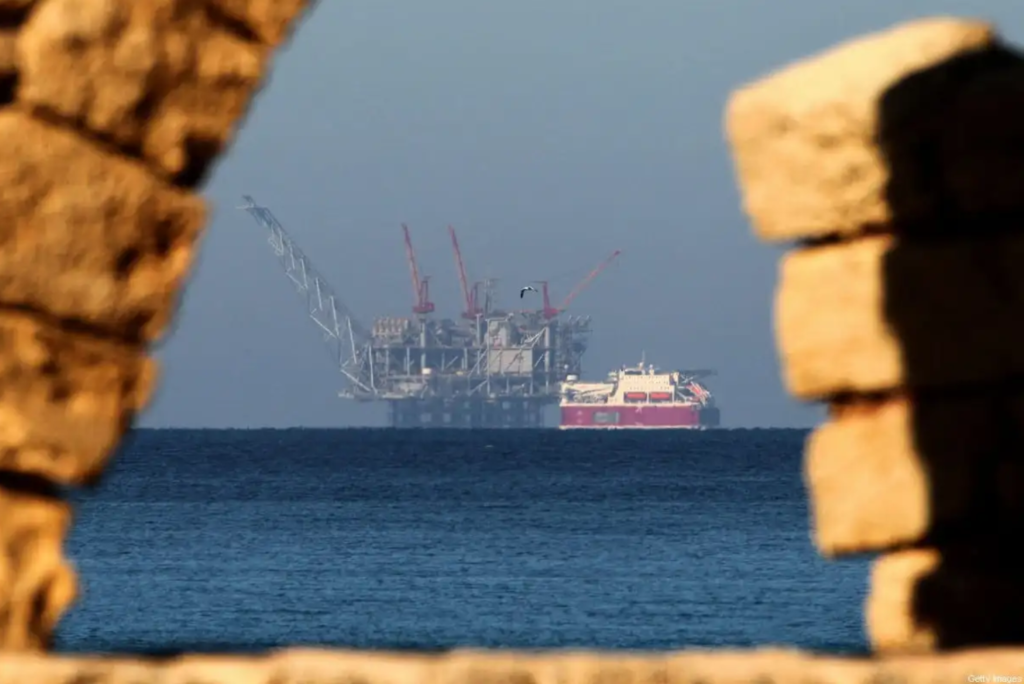Part II in my series on genocide, climate injustice, and eco-colonialism in Palestine
On October 29, 2023, a piece of climate-related news went largely under the radar: Israel granted twelve licenses to six fossil fuel companies, including British Petroleum and Italian energy company Eni, to explore and discover new offshore natural gas (also known as “fossil gas”) fields. While the news about gas exploration off the coast of Israel may seem unrelated to the genocide of Palestinians, it touches issues of increasing emissions and reliance on fossil fuel extraction, land sovereignty, and Israel’s eco-colonialism.
This is the second in my series on climate justice, eco-colonialism, and genocide in Palestine. Thanks so much to Stephanie Noren, James Williams, Emily Pinckney, Brittney Miller, and Neiko Alvarado for your collaboration and invaluable feedback.
INSIDE THE DREAM I SHALL HAVE TO UNLEARN
THE BITTERNESS OF THE WARHUNGRY CAPITALIST LIFE
THE EMPTY MEANINGS OF THE LOBBYING FIRM!
THE LANGUAGE THAT TURNS ME CRUEL AND USEFUL!
IN THE DREAM I AM REQUIRED ONLY BY MY LOVERS
NEVER THE EXTRACTIVE DRILLS OF THE OILEATERS!
I HAVE BEEN UNMADE BY THE DREAM OF GOD
I HAVE BEEN RELEASED FROM MEANING!
from “PALESTINE IS A FUTURISM: THE DREAM” by Fargo Nissim Tbakhi
Fossil fuel profits as a cover for genocide
Israel began developing an internal fossil fuel industry after the discovery of offshore oil gas fields in the 2000s, resources that are valued at $524 billion U.S. dollars (USD) and whose profits are limited to the Israeli government. A country’s development of fossil fuel industry for economic gain is nothing new, but the development of these particular gas fields is directly linked to the Israel’s colonization of Palestine.
A 2019 report by the United Nations Conference on Trade and Development (UNCTAD) describes how the discovery of gas fields off the coast of Gaza initially led to negotiations between Israel and Palestine on a shared energy deal. However, changing political circumstances, including the election of the Hamas government in Gaza in 2007, led to the deals falling apart. Per the UNCTAD report:
“A turning point was the Israeli military operation in Gaza in December 2008, which had several implications related to the control of the strategic offshore natural gas reserves. In the wake of the operation, Palestinian natural gas fields were effectively brought under Israeli control without regard for international law. The issue of sovereignty over Gaza’s gas fields is crucial. From a legal standpoint, and based on the previous discussion, the gas reserves belong to the Occupied Palestinian Territory.” (p. 21)
In June 2023, Israeli Prime Minister Benjamin Netanyahu gave preliminary approval for development of Gaza Marine gas fields by British Gas, signaling that a deal with the Palestinian Authority and Hamas may be imminent, though recent events have likely threatened any such collaboration.

Israel has had plenty of time to capitalize off of these resources already: Israel’s gas production has risen by 700% in just the past decade. Israel has begun exporting fossil gas in recent years, beginning with a $10 billion deal with Jordan in 2016 for an Israeli consortium, led by U.S. company Noble Energy, to export around 45 billion cubic meters of gas to Jordan over 15 years. Part of Israel’s aim for their fossil fuel industry has been to use energy commerce as an avenue for diplomacy and normalization with neighboring Arab countries, many of whom oppose Israel’s colonization of Palestine. The deal faced huge opposition within Jordan when Israel’s exports began in early 2020; the 2016 deal had been made by Jordan’s non-elected government (appointed by the king), under immense pressure from the United States, while Jordan’s elected Parliament passed a resolution against it. Jordanians protested the deal in the streets in defense of Palestinians, and Jordanian analysts say that the deal has harmed Jordan’s burgeoning renewable energy industry.
Despite opposition, Israel’s gas exports have continued, expanding to Egypt as well. Israel began drilling offshore for crude oil in late 2022 at the Karish oil field—previously disputed territory between Israel and Lebanon, but the U.S. played a part in brokering a deal which allowed Israel to make their first crude oil exports to Europe in February 2023. Prior to October 7, 2023, Israel was also finalizing plans for exporting gas to Europe by early 2024, in part because of western sanctions on Russia after its invasion of Ukraine in early 2022.
The gas licenses that Israel granted just two weeks into their current escalation of genocidal violence prompted Palestinian human rights groups Adalah, Al-Haq, Al Mezan Center for Human Rights, and PCHR to challenge the decision as illegal under maritime law earlier this year. A significant portion of the area where Israel has granted licenses is within the maritime boundaries of the State of Palestine under the UN Convention on the Law of the Sea (UNCLOS). Israel is not party to UNCLOS and does not recognize Palestine as a state, but Israel is clearly in violation of international law, as are the fossil fuel companies involved.
Energy injustice and apartheid
In the absence of Palestinians controlling their own energy resources, Israel’s obligations to occupied Palestine also extends to electricity. Over 90% of electricity in occupied Palestine is imported from the Israeli electric company, and despite Palestinians having the lowest levels of energy use in the region, they pay the highest prices for that electricity. This is a classic example of energy injustice, a type of environmental injustice that harms frontline communities by restricting their access to lifesaving energy.
Gaza shows us how this injustice functions: due to Israel’s 19-year blockade of Gaza and frequent shelling, Gaza only has one power plant and is forced to purchase fuel from Israel at high prices, requiring the plant to operate well below its capacity. Prior to October 7, the Gazan plant supplied 60 megawatts of electricity and another 120 megawatts were imported from Israel, accounting for just 40% of the actual average electricity need in Gaza. As a result, Gazans suffered daily power cuts for up to 12 hours, even during heat waves like Palestine faced in the summer of 2023.
Over the years, hospitals have suffered extensively from the blackouts, causing the deaths of dozens of patients in intensive care units (ICUs) when electricity is out and the continuous deferral of non-emergency medical care. The lack of electricity has cascading environmental impacts: wastewater treatment plants can’t process sewage because of electricity shortages, which leads to untreated or partially-treated water being dumped into the Mediterranean Sea, harming Gaza’s fishing industry and endangering those who go swimming in the ocean during heat waves because they have no other access to cooling.
After October 7, Israel shut off the supply of electricity and fuel to Gaza, and the impacts were felt almost immediately. Gaza’s power station ran out of fuel on October 11. Within a month, this had already led to catastrophic impacts, shuttering of hospitals and ICUs, shutting down of Gaza’s desalination plants, disruption of solid waste collection and sewage treatment, lack of weatherized shelter, and more. Since at least the last week of October, Israel has bombed rooftop solar panels and generators on homes and hospitals, sabotaging remaining sources of power. As Israel’s destruction of Gaza continues, these dynamics have only worsened, even as they get less and less attention in the press.
The lie of Israeli “clean” energy
Israel’s destruction of Palestinian solar panels is not a recent development. Solar energy should be a boon for Palestinians: occupied Palestine has some of the highest levels of solar irradiation in southwest Asia, and while there is little open space for large-scale photovoltaic solar panels within occupied Palestine – particularly in densely-populated Gaza – even smaller-scale rooftop solar panels could help with the energy shortage. And indeed, there have been successful projects in the past coordinated by the Palestinian Environmental Network of NGOs (PENGON) to empower Palestinians, particularly Palestinian women, to generate their own solar energy.
However, not only does Israel severely restrict the supplies that are available for Palestinians in the West Bank and Gaza, but Israel has systemically confiscated and often demolished solar panels that are intended to provide power to Palestinians, even from projects funded by international NGOs or governments, like the solar panels and shelters in the West Bank donated by the European Union that Israel destroyed in 2021. Israel says that these projects weren’t properly permitted, but at least 98.5% of building permits from Palestinians are denied in Area C of the occupied West Bank where Israel controls planning and development, including permits for solar infrastructure or even for connecting to existing electrical grids.
Meanwhile, Israel’s own access to solar energy is reliant on illegal occupation of Palestinian land: as of 2017, at least four Israeli commercial solar fields were sited in illegal West Bank settlements. Similarly, wind farms have been sited in the occupied Syrian Golan Heights, threatening displacement and loss of agricultural livelihoods to the Jawlani communities there. As climate researcher and activist Manal Shqair writes in Dismantling Green Colonialism: Energy and Climate Justice in the Arab Region:
“The strength of the Israeli solar energy sector its in stark contrast to the fact that tens of thousands of Palestinian (second-class) citizens of Israel living in 35 ‘unrecognized’ villages in the Naqab Desert have no access to electricity (or water, health care, and education) as part of the discriminatory Israeli policies that are designed to force them from their land and replace their villages with Jewish-only settlements and [Jewish National Fund]-planted pine trees.” (p. 79)
This is the heart of eco-colonialism: Israel uses stolen land to generate energy that they can claim as clean – even as they continue to extract, use, and sell fossil fuels in far greater amounts, and even though there is nothing “clean” about colonialism and injustice – all while keeping Palestinians energy-impoverished on their own land.
Next week, I’ll look at the role that trees play – including the JNF-planted trees that Shqair mentions – in Israel’s eco-colonialism.
Mutual Aid Request
This newsletter will never be monetized, but I believe that mutual aid is one of the ways we can build community and support the folks who need it the most. If you like my writing, please consider giving; even just a few dollars (or whatever currency you’re paying in) can help.
Mohammed, a 23 year-old IT graduate who cares for his seven orphaned siblings (incluidng Mahmoud and Tala in the video above, as well as their brother Ahmed, who suffers from hyperthyroidism) and his aunt, has already had to move his family from north Gaza to a tent in Rafah for their safety. Their fundraiser has only received $760 USD out of their goal of $80,000 USD to get their whole family over the border to Egypt. Please help him and his family escape genocide and seek medical care.







